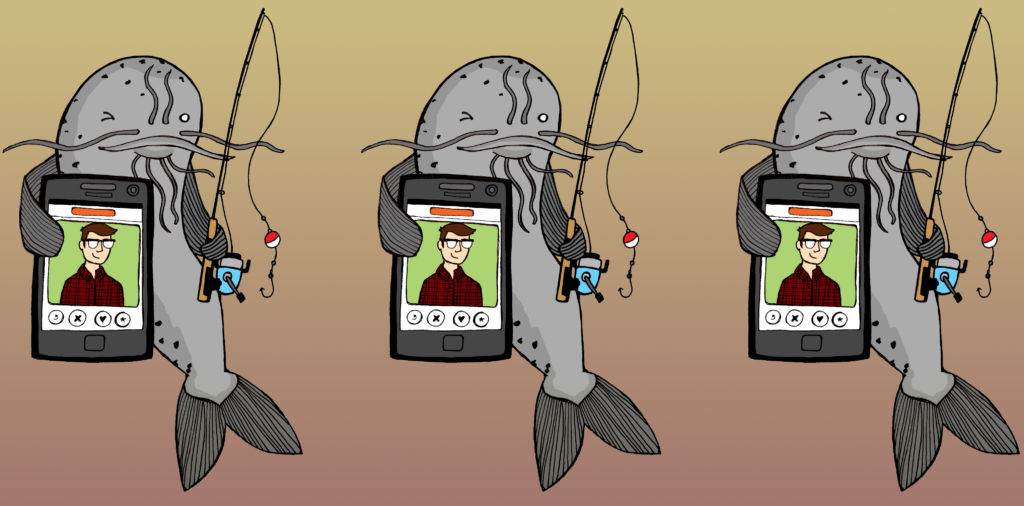Carleton University student Corey Fisher* swiped right on a girl that he matched with on Tinder. It began as many relationships start in the digital age. Using Tinder, Fisher exchanged messages with the girl for about a week, exchanging information about everything from their favourite TV shows to their frustrations about school. Fisher wanted to see where the relationship would go, so they agreed to meet for coffee at a Starbucks in downtown Ottawa.
Fisher’s first and only face-to-face encounter with the girl left a bitter taste is his mouth and it wasn’t the coffee. When he arrived at Starbucks, he found the girl sitting at a table with pamphlets spread out in front of her.
“I’m a missionary sent from the Lord,” she says. “I’m here to do the Lord’s work, and I think you should join me.”
Fisher discovered that the girl did not want to date him, but instead wanted to recruit him into her missionary project.
“I was confused,” Fisher said. “I don’t have a problem with religion, but Tinder’s not the platform (to recruit people).”
It’s no secret that online dating services are popular, especially among students. But there’s a hidden scam culture that takes place over them. Not everyone using online dating services is actually interested in online dating. Hidden intentions can range from full-fledged money-laundering scams to simple, spontaneous pranks.
The act of pranking someone using a fake persona to insinuate a relationship is called “catfishing.” The term was popularized by a 2010 documentary called Catfish, which was later adapted into a popular program on MTV. Catfish was a hit—as was the act of catfishing. Even celebrities couldn’t avoid the phenomenon.
In 2013, San Diego Chargers linebacker Manti Te’o found himself involved in a high profile catfishing scenario. After mourning the death of his online girlfriend, he learned that she in fact never existed.
Catfishing is done using someone else’s pictures, often ripped without their knowledge or permission from a social media platform like Facebook or MySpace (yes, MySpace).
Ottawa resident Scott Clément was surprised to see a Facebook friend request from “Scott G Snowden.” The name was not familiar but the profile picture was: it was Clément himself. He scrolled through Snowden’s page and realized that the account had been posting his pictures and videos for five years, pretending to be him. Eerily, Snowden shares a surname with Edward Snowden, a former CIA agent who controversially revealed thousands of secret documents to the public. Clément’s friends reported the account to Facebook and Clément was notified that it was removed from the website.
Clément was suspicious, but not too fearful.
“I think I was just fascinated that somebody would go to the lengths that (they) went to in order to pretend to be somebody they weren’t,” he said. “I knew the account was harmless.”
Before the account was deleted, he left various comments on the stolen photos, pointing out inaccuracies that Snowden had made in their captions.
“Actually Mr. Snowden, this picture of you was in Melbourne, not Sydney,” Clément typed.
Clément still does not know who was behind the account or why it was created.
“I don’t know if the guy was actually trying to, or successfully, catfishing people,” he said.
Clément speculates that it could have been a gamer who “wanted to appear to be someone he wasn’t to his cyber friends”—but to this day, he doesn’t know for sure.
“Dating apps can be a great utility, but at the same time, you have to be careful,” said Craig Delmage, Algonquin College’s senior manager of information security and data privacy.
Delmage points out that cartoonist Peter Steiner predicted the catfishing phenomenon when an illustration of his was published in the New Yorker in 1993. In the illustration, two dogs are shown. One dog is using a computer, and says to the other, “on the internet, nobody knows you’re a dog.” The cartoon was initially meant to be a quirky take on the rise of accessible computer technology, but the cartoon has remained iconic for decades due to its relevance.
Delmage has five pieces of advice for those who want to explore dating apps with good intentions but are concerned about those with bad intentions.
1. If they ask for money, run.
2. Act like a detective.
“They could be talking to 40 or 50 people at a time, so you have to ask for information,” he said. “Try to meet face-to-face.” But before that happens, Delmage suggests having a phone conversation.
3. Assess the profile’s pictures to ensure their authenticity.
There are plenty of online tools that can help the user backtrack the origins of an image. It is also effective to ask the person on the other end to send a picture of them with a specified name or phrase written on a piece of paper.
4. Scammers will often lie about catastrophic events in their life, and use them as excuses to avoid meeting in-person.
5. Protect yourself and your technology.
“Create a specific email account for (online dating),” he suggests. “Only use your first name at first.”
There are plenty of theories as to why people catfish.
Delmage says that some will do it to explore their own sexuality and identity.
Stephanie Michele from Los Angeles, California speculates that the person who catfished her years ago on a dating app called Hinge years ago may have been fulfilling a sexual fantasy or addiction to do the nature of their talks.
When Michele realized the person she was speaking to was insincere, she took matters into her own hands. Michele ended the relationship, but that wasn’t enough. She was frustrated with how easy it is to miscommunicate online.
“So much of what is interpreted from a text is assumed without clarity of tone, eye contact and the ability to ask for further context,” Michele said.
She created NoTextOrNext.com, a platform that users can use to share their stories, and take the “No Text” pledge, ensuring that they’ll use verbal communication for serious conversations.
“With No Text or Next I have one simple goal – to promote consideration and use of communication guidelines that better serve meaningful connection, conversation and relationships.”
Michele has managed to turn her negative experience into a positive, inclusive campaign, proving that those who feel violated or betrayed are not helpless.
“If you have been catfished, the worst thing you can do is allow it to harden your heart or be less trusting of all people,” she said. “Get angry and then get over it. Forgive so you can move on.”
Follow Wade Morris and Glue Magazine on Twitter.

